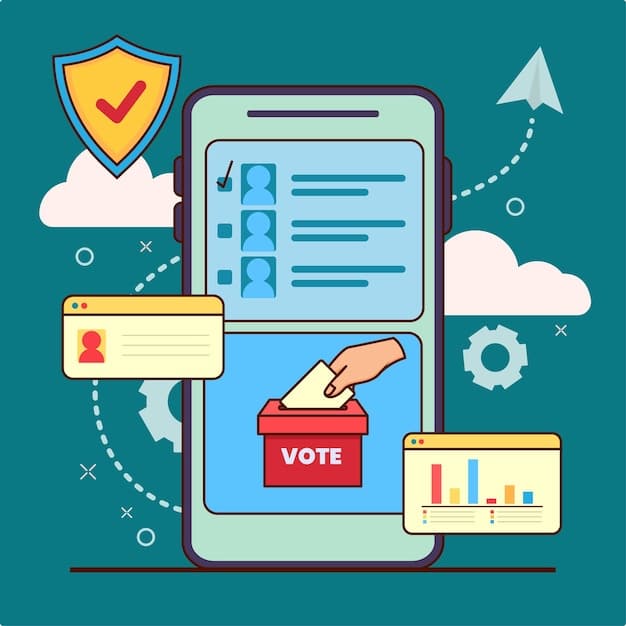Blockchain Voting: Enhancing US Election Security with Blockchain

Blockchain voting systems propose a secure and transparent method for conducting elections in the US, leveraging blockchain technology to enhance election security and integrity by ensuring immutable records and verifiable voting processes.
Can blockchain voting systems improve election security in the US? This question has sparked considerable debate as the nation seeks to strengthen its electoral processes against threats and ensure every vote is accurately counted and securely stored.
Understanding Blockchain Voting Systems
Blockchain voting systems represent a novel approach to electoral processes, promising greater transparency and security. Unlike traditional methods, these systems utilize blockchain technology to record and verify votes in a decentralized and immutable manner.
The core concept involves creating a digital ledger where each vote is recorded as a transaction and grouped into blocks. These blocks are then linked together chronologically and secured cryptographically, ensuring that no vote can be altered or deleted without detection.
How Blockchain Voting Works
Blockchain voting systems operate through a series of interconnected steps, each designed to enhance voter confidence and prevent fraud. The process begins with voter authentication and culminates in the secure and verifiable tabulation of results.
- Voter Registration and Authentication: Voters are registered and issued unique digital identities, which are securely stored on the blockchain, ensuring that only eligible citizens can participate.
- Casting the Vote: Voters use their digital identities to cast their votes through a secure interface. Each vote is encrypted and recorded as a transaction on the blockchain.
- Vote Verification: The blockchain network validates each transaction, ensuring that it is legitimate and cannot be altered. This process involves multiple nodes verifying the vote.
- Tabulation of Results: Once the voting period ends, the blockchain network tabulates the results. Because the blockchain is transparent and immutable, the results are verifiable by anyone with access to the network.
By leveraging the decentralized and immutable nature of blockchain, these systems aim to address many of the vulnerabilities associated with traditional voting methods.

In conclusion, blockchain voting systems offer a potentially transformative solution for enhancing the security and transparency of elections, addressing key concerns about voter fraud and data tampering.
Potential Benefits of Blockchain in Elections
The adoption of blockchain technology in elections could bring about a host of benefits, addressing some of the most pressing issues facing current electoral systems. Enhanced security, increased transparency, and improved voter turnout are just a few of the potential advantages.
The decentralized and cryptographic nature of blockchain makes it extremely difficult for malicious actors to tamper with vote records. Each transaction is verified by multiple nodes on the network, ensuring that any unauthorized changes are immediately detected.
Enhanced Security
Security is arguably the most significant advantage of blockchain voting systems. Traditional voting methods are often vulnerable to hacking, data manipulation, and other forms of electoral fraud. Blockchain, with its decentralized and encrypted ledger, significantly reduces these risks.
Increased Transparency
Transparency is another key benefit. With blockchain, all transactions are recorded on a public ledger, allowing anyone to verify the integrity of the voting process. This level of transparency can increase voter confidence and reduce suspicions of fraud.
- Immutable Records: Once a vote is recorded on the blockchain, it cannot be altered or deleted, ensuring the integrity of the voting process.
- Auditable Transactions: Every transaction is auditable, allowing election officials and the public to verify the accuracy of the vote count.
- Reduced Risk of Manipulation: The decentralized nature of blockchain makes it more difficult for any single entity to manipulate the voting process.
Furthermore, blockchain can streamline the voting process, making it easier for citizens to participate in elections. Online voting platforms powered by blockchain can reduce administrative overhead and make voting more accessible.

In conclusion, the potential benefits of blockchain in elections are substantial, ranging from enhanced security and transparency to improved voter participation and reduced administrative costs.
Challenges and Concerns
Despite the promising benefits, blockchain voting systems are not without their challenges and concerns. Scalability, security vulnerabilities, and accessibility issues are among the key obstacles that must be addressed before widespread adoption can occur.
Blockchain networks can be slow and inefficient when handling large volumes of transactions. In the context of national elections, this scalability issue could lead to lengthy delays and voter frustration.
Scalability Issues
One of the primary challenges is scalability. Traditional blockchain networks can process only a limited number of transactions per second, which may not be sufficient for handling the high volume of votes in a large-scale election.
Security Vulnerabilities
While blockchain is generally considered secure, it is not immune to vulnerabilities. Smart contracts, which are used to automate voting processes, can be susceptible to bugs and exploits. Additionally, there are concerns about the potential for 51% attacks, where a single entity gains control of the majority of the network’s computing power and can manipulate the blockchain.
- Smart Contract Vulnerabilities: Flaws in smart contracts can be exploited by hackers to manipulate vote counts or steal voter data.
- 51% Attacks: A malicious actor controlling the majority of the network’s computing power could potentially rewrite the blockchain and alter vote records.
- Key Management: Securely managing private keys is crucial for preventing unauthorized access to voter accounts. Weak or compromised keys could allow attackers to cast fraudulent votes.
Moreover, accessibility remains a significant concern. Not all citizens have access to the technology needed to participate in blockchain-based voting. This digital divide could disenfranchise vulnerable populations and undermine the fairness of elections.
Addressing the Challenges
Overcoming the challenges associated with blockchain voting systems requires a multifaceted approach. Technological innovations, regulatory frameworks, and public education efforts are all essential for ensuring the safe and equitable implementation of blockchain in elections.
Scalability issues can be addressed through the development of more efficient blockchain protocols. Layer-2 solutions, such as sidechains and rollups, can increase transaction throughput without compromising security.
Technological Solutions
Technological solutions are critical for addressing the scalability and security challenges. Innovations in blockchain technology, such as sharding and delegated proof-of-stake (DPoS) consensus mechanisms, can improve transaction throughput and reduce energy consumption.
Regulatory Frameworks
Clear and comprehensive regulatory frameworks are needed to govern the use of blockchain in elections. These frameworks should address issues such as voter registration, data privacy, and auditability.
- Data Privacy: Regulations must ensure that voter data is protected and used only for legitimate purposes.
- Auditability: The voting process should be auditable, allowing election officials and the public to verify the accuracy of the vote count.
- Security Standards: Strict security standards should be established to protect against hacking and other forms of electoral fraud.
Furthermore, it is crucial to educate the public about the benefits and risks of blockchain voting. Misinformation and skepticism can undermine trust in the electoral process. Public education campaigns can help to dispel myths and promote informed decision-making.
Examples of Blockchain Voting Initiatives
Several blockchain voting initiatives have been launched around the world, offering valuable insights into the potential and limitations of this technology. These real-world examples highlight the diverse approaches being taken and the lessons being learned.
West Virginia piloted a blockchain voting system for overseas military personnel in 2018. The initiative aimed to make it easier for deployed soldiers to participate in elections, but it also raised concerns about security and accessibility.
Voatz
Voatz is a mobile voting platform that uses blockchain technology to secure elections. It has been used in several pilot programs in the United States, including West Virginia’s 2018 midterm elections. While Voatz aimed to increase accessibility for overseas voters, it faced scrutiny over security concerns.
Follow My Vote
Follow My Vote is an open-source blockchain voting platform that focuses on transparency and verifiability. It aims to provide a secure and transparent voting experience by allowing voters to verify that their votes have been accurately recorded. Follow My Vote emphasizes end-to-end verifiability and has been tested in various community elections.
- Enhanced Accessibility: Blockchain voting systems can make it easier for citizens to participate in elections, particularly those who live overseas or have disabilities.
- Improved Voter Turnout: By streamlining the voting process and reducing barriers to participation, blockchain can help to increase voter turnout rates.
- Greater Trust in Elections: The transparent and auditable nature of blockchain can increase voter confidence and reduce suspicions of fraud.
These initiatives demonstrate the potential of blockchain to transform the electoral process, but they also highlight the importance of addressing security and accessibility concerns.
The Future of Blockchain Voting in the US
The future of blockchain voting in the US hinges on addressing the challenges and building public trust. As technology evolves and regulatory frameworks are developed, blockchain could play an increasingly important role in securing and modernizing elections.
Widespread adoption of blockchain voting systems is unlikely to occur overnight. However, as pilot programs continue and the technology matures, blockchain-based solutions could become a mainstream option for enhancing election security and integrity.
Building Trust
Building trust in blockchain voting systems is essential for ensuring their widespread adoption. This requires transparency, accountability, and security measures to protect against fraud and manipulation.
Regulatory Clarity
Clear regulatory guidelines are needed to govern the use of blockchain in elections. These guidelines should address issues such as voter registration, data privacy, and auditability to provide a legal framework for blockchain voting initiatives.
- Increased Transparency: Greater transparency in the voting process can help to build public trust and reduce suspicions of fraud.
- Enhanced Security: Blockchain technology can provide a more secure and tamper-proof voting system.
- Improved Accessibility: Blockchain voting systems can make it easier for citizens to participate in elections, particularly those who live overseas or have disabilities.
The future of blockchain in US elections will depend on the ability of stakeholders to address these challenges and build a system that is both secure and accessible to all citizens.
| Key Point | Brief Description |
|---|---|
| 🗳️ Enhanced Security | Blockchain’s cryptography and decentralization protect against fraud and manipulation. |
| 🌐 Increased Transparency | Public ledger allows for verification of vote integrity, promoting trust. |
| 🔑 Key Challenges | Scalability, security vulnerabilities, and accessibility are major concerns. |
| 🏛️ Regulatory Needs | Clear frameworks are essential to govern data privacy, auditability, and security. |
Frequently Asked Questions
▼
Blockchain voting uses blockchain technology to record votes, ensuring immutability and transparency. Each vote becomes a transaction on a distributed ledger, validated by multiple nodes.
▼
Blockchain enhances security through its decentralized nature, making it nearly impossible to tamper with vote records. Cryptographic techniques further secure data, minimizing hacking risks.
▼
Key challenges include scalability (handling large vote volumes), security vulnerabilities (smart contract flaws), and accessibility (ensuring all citizens can participate), which require innovative solutions.
▼
Yes, West Virginia piloted blockchain voting in 2018 for overseas military personnel. However, these initiatives faced scrutiny regarding security and accessibility, highlighting areas for improvement.
▼
Regulatory measures must address data privacy, auditability, and security standards. Clear legal frameworks are essential to ensure fair, secure, and transparent blockchain voting systems are implemented.
Conclusion
While blockchain voting systems offer a promising avenue for enhancing election security in the US, significant challenges remain. Overcoming these obstacles through technological innovations, regulatory frameworks, and public education will be crucial for realizing the full potential of blockchain in modernizing and securing the nation’s electoral processes.





